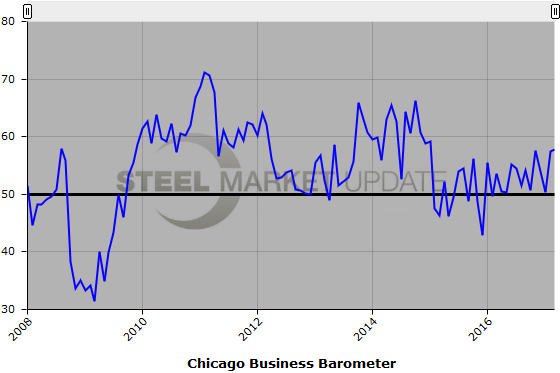Market Data

April 1, 2017
Chicago Business Barometer Stable at 57.7 in March
Written by Sandy Williams
The MNI Chicago Business Barometer only moved up slightly in March after a surge in points in February. The March reading was 57.7, up from 57.4.
Increases were reported in new order and production with indexes reaching 4 and 14 month highs, respectively. Order backlogs increased for the third month but were still below the breakeven level, said MNI. Employment levels retreated in March.
Inventory grew at the fastest pace since March 2015 as manufacturers sought to keep up with increased demand. Prices paid eased after three consecutive monthly gains.
When asked about new orders for second quarter, nearly half of respondents said they expect higher order levels while 41 percent expect orders to remain about the same as first quarter.
“The March Chicago report echoed last month’s upbeat tone of general business conditions. Though the Barometer was little changed, the underlying trend for many key indicators shows improvement, with a shift away from firms reporting worsening to that of remaining at the same level as last month,” said Shaily Mittal, senior economist at MNI Indicators.
The Barometer is a composite diffusion indicator made up of the Production, New Orders, Order Backlogs, Employment and Supplier Deliveries indicators and is designed to predict future changes in US gross domestic product (GDP). An indicator reading above 50 indicates expansion compared with a month earlier while below 50 indicates contraction. A result of 50 is neutral. The farther an indicator is above or below 50, the greater or smaller the rate of change.
Below is a graph showing the history of the Chicago Business Barometer. You will need to view the graph on our website to use its interactive features, you can do so by clicking here. If you need assistance logging into or navigating the website, please contact our office at 800-432-3475 or info@SteelMarketUpdate.com.








